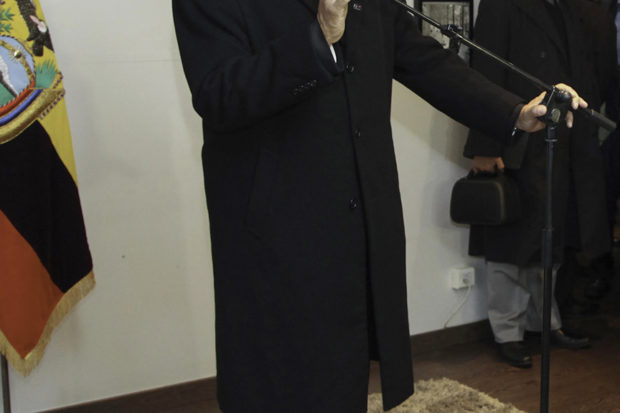
By Leni Villagomez Reeves
First round victory—What’s next? The first round of elections in Ecuador was Feb. 7, and running mates Andrés Aráuz and Carlos Rabascall, running on a platform of largely restoring the country to the policies of former president Rafael Correa, won that round by a large margin with more than 32% of the votes. The second round is scheduled for April 11, and there are some important points to follow.
In the previous election, what people voted for is not what they got. It’s important to know what happened in the last election. In the 2017 election, the people of Ecuador voted in Lenin Moreno, who had been a vice president earlier in the Correa administration and who ran as the candidate of the leading left party—Alianza País—headed by Correa.
The citizens expected a continuation of the progressive democratic socialist policies of investment in education, health and social programs. The minimum wage and social security benefits had been raised, economic growth was strong and a tax on the rich was in place.
Moreno: sellout or sleeper agent? After assuming the presidency, Moreno betrayed his campaign promises, his supporters and his country. He adopted U.S.-supported right-wing policies favoring the rich, withdrew Ecuador from Global South alliances, such as ALBA (Bolivarian Alliance for the Peoples of Our America), UNASUR (Union of South American Nations) and MERCOSUR (Southern Common Market), and negotiated International Monetary Fund (IMF) loans and U.S. Development Corporation loans requiring privatization, then imposed harsh neoliberal austerity measures that impoverished people and weakened the public sector, including public health.
Ecuador’s economy crashed, and the pandemic struck. The Covid-19 per capita death toll was among the highest in the world. There were bodies on the street in Guayaquil, Ecuador’s largest city.
Manipulation of law to attack political opponents. Moreno and his neoliberals persecuted members of the former administration on invented charges of corruption, an operation that has become a classic right-wing soft-coup strategy. Correa cannot return to Ecuador, and members of his administration are in exile in Mexico, or, as in the case of former vice president Jorge Glas, in prison where Glas recently got Covid-19.
Recently Moreno has met with Organization of American States (OAS) chief Luis Almagro, who you might remember was instrumental in promoting the post-election coup in Bolivia in 2018. On Feb. 15, just a week after the election, the OAS expressed “concern” about the election in Ecuador, and that’s how it starts.
Will the Moreno government try to manipulate the election in Ecuador, or simply disregard it, using the OAS as cover? The Aráuz team has already had to work through lots of strange legal obstacles imposed by the National Electoral Council, following Moreno’s orders, even to be in the election—and win the first round.
Second round: Aráuz versus Lasso. What will Perez do? Two candidates tied for second with close votes, but it will be the right-wing banker, Guillermo Lasso, advancing. Official results from the first round showed Aráuz won with 32.7% of the vote. Lasso, in his third try at the presidency, got 19.74% and Yaku Perez got 19.39% in the final recount, about 32,600 votes behind Lasso, which will eliminate Perez from the presidential runoff round; Perez is claiming fraud.
Certainly, Lasso has enormous political, media, legal and financial resources. Oddly enough, Perez supported Lasso in the 2017 runoff election, when Moreno was thought to be the left candidate. Perez might do so again, although there are reports that he is urging supporters to spoil their ballots in the April runoff, with the hope of invalidating the election.
In 2017, Perez changed his name from Carlos Ranulfo, the name under which he got his doctorate in law. He is of Quechua-Cañari heritage and was the candidate of the Pachakutik Party, where he represents the right-wing faction, with a free trade deal with the United States among his proposals, many of which are consistent with the U.S. and Ecuadorian upper-class programs and goals.
It is not clear whether his positions are genuine or whether he is an astroturf activist. But his support for the coup in Bolivia—a racist anti-Indigenous and anti-environmental right-wing overthrow of an elected government—seems indicative. Certainly, the Indigenous movements in Ecuador are far more diverse and mostly farther left than his views.
First-round winner Aráuz defines his views. In a Feb. 16 interview, Aráuz outlined his plans and views, including some differences between his ideas and those of Correa. He proposes emergency economic aid to the most vulnerable people of Ecuador, an aggressive vaccine program and an emergency Internet program so that all students can receive classes during the pandemic.
He pointed out the success of investment in the social sector, infrastructure, public health and education, and plans to continue these policies. He reiterated his promise to cancel the IMF debt and criticized foreign interference in Latin America.
Not a copy of Correa. When asked about his differences from Correa, he cited issues of freedom of expression and the press as human rights. Aráuz also stressed the need for a policy that complies with the Ecuadorian Constitution, recognizing the need for a plurinational state, with degrees of autonomy for the Indigenous peoples, with Indigenous languages present in the educational system and economic development that is consistent with the needs of the local communities and makes them the main stakeholders in these projects, rather than a neocolonial extractivist agenda.
April 11 runoff election. Everyone wants Moreno out. Will he try to delay the election? Will he bring in the OAS dirty business team to try to subvert it? Will Aráuz and Rabascall unite the left: progressives, social democrats and the left-wing Indigenous people’s movements?
*****
Leni Villagomez Reeves is a local physician and activist. Contact her at lenivreeves@gmail.com. Check out her news and views about Cuba on Facebook (fresnosolidarity/).
